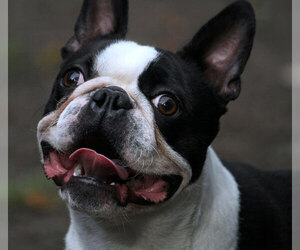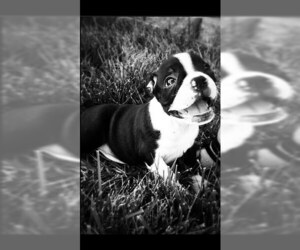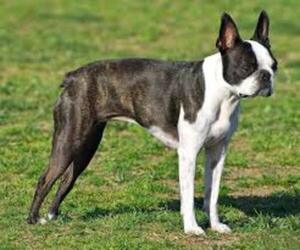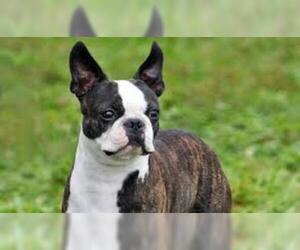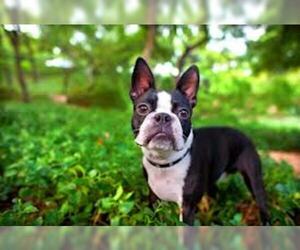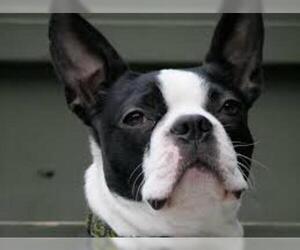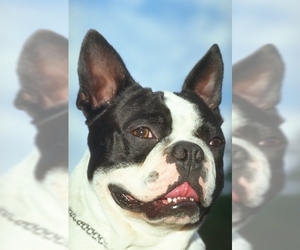
All about Boston Terrier dog breed
A.K.A. :American Gentleman, Boston Bulldog, Roundheads, Little Blue Boys, Tuxedo Terrier
Size
Grooming requirements
Exercise requirements
Good with other dogs
Watchdog ability
Energetic
Training requirements
Playful
Affectionate
Good with other pets
Good with children
Good with strangers
Winter
Summer
Healthiness
Protective
Life Span
| Pure Breeds | Member |
| Breeds A - Z | B |
| Breeds by Group | Companion Non-Sporting |
| Breeds by Trait | Good With Kids Low Shedding |
| Overview: | The Boston Terrier, affectionately known as the "American Gentleman," originated in the late 19th century in Boston, Massachusetts, making it one of the few breeds developed in the U.S. Physically, they are compact and muscular, typically weighing between 12 and 25 pounds, with a distinctive "tuxedo" coat pattern—black or brindle with white markings on the muzzle, chest, and often a blaze between the eyes. Their expressive, round eyes and erect, bat-like ears are hallmark features. Temperamentally, Boston Terriers are friendly, intelligent, and lively, known for their charming personalities and unwavering loyalty. They adapt well to various living situations, making them excellent companions for both families with children and individuals in apartments, as long as they receive adequate exercise and mental stimulation. Regarding health, they are a brachycephalic (short-nosed) breed, so care must be taken in hot weather to prevent overheating, and they can be prone to eye conditions and patellar luxation. Overall, their delightful nature and manageable size make them a beloved choice for many. |
F.A.Q.
All You Need to Know About the Boston Terrier Breed
The Boston Terrier, affectionately known as the "American Gentleman," is a charming and distinctive breed originating from the U.S. These compact dogs boast an excellent, friendly temperament, making them superb companions. Physically, they're recognizable by their tuxedo-like black and white coat, brachycephalic (short) snout, and expressive large eyes. Their moderate size and adaptable nature mean they are an ideal choice for families and thrive in apartment living, provided they receive daily walks and playtime. Grooming needs are minimal – a weekly brush keeps their coat sleek. While generally robust, potential owners should be aware of common health considerations like respiratory issues due to their short snout, and eye conditions. With their playful spirit and loving disposition, a Boston Terrier is a low-maintenance yet highly rewarding addition to most homes.Boston Terrier Weight: A healthy adult Boston Terrier typically weighs between 10 to 25 pounds. While there isn't a significant average size difference between males and females, individual dogs can vary within this range. This average weight for Boston Terrier makes them an ideal companion for many living situations.
Boston Terrier Height: How Tall Is a Boston Terrier?
Curious about the typical Boston Terrier height? These charming, compact dogs are known for their sturdy build and moderate size, making them excellent companions for various living situations. When considering the average size of a Boston Terrier, we measure from the ground to the top of their shoulder (known as the withers).The average height of a Boston Terrier typically ranges between 15 to 17 inches. This measurement falls within the breed standard set by kennel clubs, ensuring consistency in their overall structure.While this is the general range, you might see some slight variations. Usually, male Boston Terriers tend to be at the higher end of this scale, sometimes reaching the full 17 inches, while female Boston Terriers might be closer to the 15-inch mark. However, individual genetics play a significant role, so it's not uncommon to find a slightly taller female or a shorter male. Puppy mill Boston Terriers, due to potentially poor breeding practices, can sometimes fall outside of these typical height ranges.Rest assured, whether your Boston Terrier is 15 or 17 inches tall, they'll still be the same lovable "American Gentleman" with a big personality in a manageable package!Boston Terrier colors include a range of beautiful coats, with specific variations recognized by major kennel clubs like the AKC. The AKC recognized Boston Terrier colors are brindle, seal, and black, all with required white markings. These white markings typically appear as a blaze between the eyes, a white muzzle, and a white chest and collar, often extending to the forelegs and hocks. Variations of brindle, such as red brindle or brown brindle, are also common.
Beyond the official standards, several rare coat types and exotic Boston Terrier variations exist, though they are not accepted for show by the AKC. These include fawn Boston Terriers, cream Boston Terriers, and red Boston Terriers. More unusual and often controversial are colors like blue Boston Terriers (a dilute black), lilac Boston Terriers (a dilute chocolate), and chocolate Boston Terriers. You might also encounter merle Boston Terriers, a pattern that can carry significant health risks and is strongly discouraged by responsible breeders. These non-standard colors often come with different pricing due to their rarity and the specific breeding lines involved.The Boston Terrier personality is generally described as friendly, intelligent, and lively. These charming dogs are known for their affectionate nature, forming strong bonds of loyalty with their families. They are highly sociable, enjoying interaction with people and often getting along well with respectful children. Their temperament of Boston Terrier makes them adaptable to various living situations, thriving in apartments due to their moderate exercise needs and compact size. While generally amiable with other pets, early socialization is beneficial. Boston Terriers are playful and good-natured, making them excellent companions for those seeking a devoted and engaging canine friend.
Boston Terrier Temperament & Personality TraitsThe Boston Terrier is renowned for its charming and affectionate temperament, making it an outstanding companion dog. They are typically friendly and sociable, eager to interact with their human families and generally welcoming of strangers. This breed is known for its loyalty and forms strong bonds, often referred to as "Velcro dogs" due to their desire to be close. Their adaptability is a key trait, allowing them to thrive in various living situations, including apartment living, as long as they receive adequate exercise and mental stimulation.When it comes to children, Boston Terriers are usually gentle and playful, often making excellent family pets, though supervision is always recommended with very young children. Their behavior with other pets is generally good, especially if socialized from a young age; they can often coexist peacefully with other dogs and even cats. While intelligent and eager to please, they can sometimes exhibit a tendency toward stubbornness, which requires consistent and positive reinforcement training. They are also quite sensitive to their owner's tone and emotions, responding best to gentle guidance rather than harsh corrections. Overall, the Boston Terrier's outgoing and loving disposition makes them a joy to live with.
Boston Terrier Care: Essential Daily Maintenance & Health TipsCaring for a Boston Terrier is relatively straightforward, making them a popular choice for many households. Their daily maintenance requires attention to several key areas.Grooming Needs: Boston Terrier care involves minimal grooming. Their short, smooth coat requires weekly brushing to remove loose hair and maintain shine. Occasional bathing (monthly or as needed) is sufficient. Nail trims should be done every 3-4 weeks to prevent overgrowth, and regular dental care – daily brushing if possible – is crucial to prevent plaque buildup and gum disease.Exercise Limitations: While playful, Boston Terriers are a low-energy dog breed with moderate exercise needs. Short, daily walks (20-30 minutes) and indoor playtime are usually enough. Due to their brachycephalic (short-nosed) anatomy, they are prone to overheating. Avoid strenuous exercise during hot or humid weather, and always provide fresh water. This how to care for a Boston Terrier tip is vital for their well-being.Dietary Considerations: Dietary considerations for Boston Terriers involve feeding high-quality dog food appropriate for their age and activity level. They can be prone to weight gain, so portion control is essential for weight management. Consult your vet for specific recommendations.Wrinkle and Ear Cleaning: Their facial wrinkles and ears require regular attention. Clean wrinkles with a damp cloth to prevent skin irritation and infection. Check and clean their ears weekly with a vet-approved cleaner to prevent wax buildup and ear infections.Climate Sensitivity: Their brachycephalic anatomy makes them very sensitive to extreme temperatures. They are prone to heatstroke in warm weather and can get cold quickly in winter. Provide a cool, air-conditioned environment in summer and warm, protective clothing in winter. Never leave them unattended in a car.Common Health Concerns: Health tips for Boston Terrier owners include being aware of common breed-specific issues. These include skin issues (allergies, hot spots), dental care problems (due to their jaw structure), eye problems (cherry eye, cataracts), patellar luxation, and respiratory issues due to their short snouts. Regular veterinary check-ups are paramount for early detection and treatment of any health concerns.
Boston Terrier activity level: How active are Boston Terriers? Boston Terriers have a moderate activity level, known for balancing short bursts of playful energy with long periods of rest. They aren't marathon runners but enjoy regular engagement.
Their daily exercise needs are manageable, typically requiring 30-60 minutes of walks or playtime. They love interactive games like fetch and short walks in the park, but due to their brachycephalic (short-nosed) anatomy, it's crucial to limit strenuous exercise, especially in hot or humid weather, to prevent overheating and breathing difficulties. Keep an eye on their breathing and always provide access to fresh water.Are they suitable for active families or low-energy households? Boston Terriers adapt well to both! While they appreciate playful interaction, they are equally content cuddling on the couch. This makes them suitable for active families who enjoy short, playful sessions, as well as lower-energy households looking for a companion who enjoys downtime. They thrive on companionship and are happy to be involved in whatever their family is doing, whether it's an exciting outing or a quiet evening at home.Breed Breakdown: What Experts Say About the Boston Terrier
I would rate the "Size" trait of the Boston Terrier a 3 out of 10.Boston Terriers are unequivocally a small breed. They typically stand between 15-17 inches tall at the shoulder and weigh a modest 12-25 pounds, with a compact, muscular build that belies their delicate appearance. When compared to other companion dogs like Chihuahuas (smaller) or Golden Retrievers (significantly larger), the Boston Terrier firmly occupies the smaller end of the spectrum. Their petite stature and low weight make them exceptionally well-suited for apartment living, frequent travel, and households with limited space. They are often described as "big dogs in a small package" due to their robust personality but their physical dimensions are undeniably on the smaller side.
I would rate the Boston Terrier's grooming requirements as a 3. This breed is relatively low-maintenance, primarily due to their short, smooth coat which sheds minimally. They don't require professional grooming, and their bathing needs are infrequent unless they get particularly dirty. While they may have a few wrinkles, these are typically shallow and only require occasional wiping to prevent irritation. Regular nail trims, ear cleaning, and teeth brushing are necessary, as with most dogs, but these are standard care rather than specialized grooming. They can be prone to allergies, which might manifest as skin issues and require more frequent bathing or veterinary care, but this isn't a guaranteed aspect of their grooming and is often managed with diet and medication rather than extensive coat care. Compared to many other companion dogs, the Boston Terrier is quite easy to care for in terms of grooming.
I would rate the Boston Terrier's exercise requirements a 4 out of 10.While not a complete couch potato, the Boston Terrier is far from a high-energy breed. Their brachycephalic (short-nosed) anatomy is the primary limiting factor, making them highly susceptible to overheating and respiratory distress during sustained or strenuous activity. They thrive on moderate daily activity, typically consisting of a couple of shorter, leashed walks (15-30 minutes each) and indoor playtime. Their energy levels are generally good for bursts of activity, like chasing a toy, but they lack the stamina for long hikes or intense running. Agility can be an option if kept short, low-impact, and performed in cool conditions, but it's not a breed that will excel in demanding canine sports. They are perfectly content with a more relaxed lifestyle and can become overheated and stressed if pushed beyond their limits. Structured routines are helpful for maintaining their weight and providing mental stimulation, but these routines should prioritize quality over quantity and always consider the weather.
I would rate the Boston Terrier's "Watchdog Ability" at a 7 out of 10. They are highly alert and keenly aware of their surroundings, often barking at the sound of a doorbell, approaching footsteps, or unfamiliar noises outside the home. This makes them excellent for providing early warnings. While not typically aggressive or prone to sustained, nuisance barking, their territorial instincts are present enough to prompt a vocal response to perceived threats or intruders. They are generally friendly once an unfamiliar person is introduced and deemed non-threatening, meaning they're not a breed that will fiercely guard or attack an intruder. However, their initial, enthusiastic barking and attentive posture are more than capable of deterring opportunistic intruders who prefer a silent entry. They are very much capable of providing meaningful early warnings in a home environment, acting as an audible alarm system, rather than just a passive companion.
I would rate the Boston Terrier's "Good with Other Dogs" trait a 9 out of 10.Boston Terriers are generally known for their outgoing, friendly, and good-natured personalities, which extends to their interactions with other dogs. They typically display a high degree of sociability and adaptability, often enjoying the company of other canines. They are usually quite tolerant of unfamiliar dogs and tend to be playful rather than aggressive. Their sturdy but compact build allows them to comfortably interact with dogs of various sizes, and their often energetic but not overly boisterous play style can blend well with different energy levels. While early socialization is beneficial for any breed, Boston Terriers often thrive in canine company and readily integrate into multi-dog households. They rarely exhibit strong dominance or aggression towards other dogs, making them excellent companions for existing pets. They generally seek out interaction and are happy to coexist peacefully, making them a breed that genuinely thrives in a dog-friendly environment.
I would rate the Boston Terrier's "Energetic" trait a 6 out of 10.Boston Terriers are a lively and playful breed, certainly not a couch potato, but they aren't the kind of dog that needs to run for miles every day. They have a good amount of energy for bursts of activity, enjoying games of fetch, short walks, and zooming around the house or yard with enthusiasm. This makes them naturally active and engaging companions, always up for a bit of fun. However, their brachycephalic (short-nosed) anatomy significantly affects their stamina and exercise tolerance. They are prone to overheating and respiratory distress, especially in warm weather or during strenuous activity. Therefore, while they possess an inherent playfulness and desire for physical stimulation, their endurance is limited. They require regular, moderate exercise but intense or prolonged athletic activities are generally not suitable for them due to their physical limitations. Compared to other companion dogs, they strike a good balance – more active than some truly laid-back breeds, but not as demanding as high-energy working breeds.
I would rate the Boston Terrier's "Training Requirements" at a 5. They are a relatively intelligent breed and generally eager to please their owners, which contributes to their trainability. They respond very well to positive reinforcement methods, particularly those involving treats and praise. However, they are not without a streak of stubbornness and can have a shorter attention span, especially as puppies or when there are distractions. This means that while they are certainly trainable, training sessions need to be kept short, fun, and engaging to maintain their focus. Consistency is absolutely key; if boundaries aren't consistently enforced, they are quick to test them. They are generally considered beginner-friendly as long as the owner is committed to consistent, positive, and patient training. They don't typically require highly experienced handling or incredibly structured routines, but a laid-back, "do whatever" approach will likely lead to an unruly pup.
I'd rate the "Playful" trait of the Boston Terrier a solid 9. Boston Terriers are renowned for their effervescent personalities. They are far from inactive; instead, they possess a naturally spirited enthusiasm for life that manifests in their love for games and interaction. Their typical activity level is moderate to high, often punctuated by bursts of energetic "zoomies" or focused play sessions. They are highly responsive to toys and playtime, often initiating games themselves by nudging a ball or bringing a favorite squeaky. Attention-seeking behavior is common, as they thrive on being involved in family activities and appreciate human interaction. This isn't a laid-back breed content to nap all day; they are generally very fun-loving and eager to engage, consistently demonstrating a cheerful and enthusiastic demeanor in their daily lives, making them significantly more spirited than many other companion dogs.
I'd rate the "Affectionate" trait of the Boston Terrier a 9 out of 10.Boston Terriers are renowned for their incredibly loving and people-oriented nature. They have a strong desire for human companionship and are often described as "velcro dogs," thriving on being close to their owners. Physical closeness is a hallmark of the breed; they are enthusiastic cuddlers, lap-sitters, and will happily burrow under blankets with their favorite people. Their loyalty is unwavering, and they are remarkably sensitive to owner emotions, often picking up on moods and offering comfort. It's not uncommon for a Boston Terrier to follow their family members from room to room, just to be in their presence. This breed absolutely thrives on affection and would be more accurately described as dependent on human interaction rather than independent when compared to other companion dogs.
I would rate the Boston Terrier's "Good with Other Pets" trait as an 8 out of 10.Boston Terriers are generally known for their friendly and adaptable nature, extending to their interactions with other animals. They typically have a relatively low prey drive, especially when compared to terrier breeds originally bred for hunting. This means they are less likely to chase or harm smaller pets like cats, and many Bostons happily coexist with feline housemates, often initiating play or cuddling.When it comes to other dogs, Boston Terriers are usually quite sociable. They enjoy the company of other canines and are often playful and good-natured in multi-dog households. While individual personalities vary, serious dog-on-dog aggression is not a common characteristic of the breed.However, the "8" rather than a "10" acknowledges a few points. While naturally sociable, proper socialization from a young age is still crucial for a Boston Terrier to ensure they grow into a well-adjusted and polite member of a multi-pet household. Without it, like any breed, they could develop shyness or react defensively. Additionally, while resource guarding is not a predominant trait, some individual Bostons, especially if not trained or if they haven't learned sharing, might exhibit mild guarding tendencies over prized toys or food, which would require management and training to prevent conflict. Their enthusiastic and sometimes boisterous play style might also overwhelm very small or timid pets, so supervision during initial introductions and playtime is always a good idea. Overall, with appropriate introductions and continued socialization, Boston Terriers are highly adaptable and thrive in homes with other pets.
I'd rate the Boston Terrier's "Good with Children" trait a strong 9 out of 10.Boston Terriers are exceptionally well-suited for families with children. Their naturally cheerful, affectionate, and even-tempered disposition makes them wonderful companions for kids of various ages. They possess a playful spirit without being overly rambunctious, enjoying a good game of fetch or a romp in the yard, but are equally content to cuddle on the couch. Their moderate energy levels mean they can keep up with active children but also appreciate downtime. Crucially, Boston Terriers are known for their patience and tolerance of typical child-like antics, including noise and the occasional clumsy handling. While supervision is always recommended with any dog and child, the Boston Terrier is inherently gentle and not prone to aggression, making them a very safe bet. They thrive on human companionship and are naturally inclined to be part of the family, often forming strong bonds with children. They don't typically *require* extensive training or supervision to be good with kids; rather, their natural temperament makes them a joy in a family setting.
I would rate the Boston Terrier's "Good with Strangers" trait a 9 out of 10.Boston Terriers are renowned for their exceptionally sociable and welcoming nature, making them naturally outgoing with unfamiliar adults. They typically display a high degree of friendliness, often approaching new people with enthusiastic tail wags and a desire for attention and affection. While individual personalities can vary slightly, the breed's general socialization tendencies lean strongly towards being approachable and amicable. They are not typically prone to excessive barking or guarding behavior when it comes to strangers, instead usually greeting them as potential new friends. Their adaptability in public or guest-filled environments is excellent; they generally thrive on interaction and are happy to be included in social settings. This natural outgoingness means they require very little, if any, specific training to be comfortable with strangers; it's an inherent part of their charming disposition.
I would rate the Boston Terrier's winter tolerance at a 3.Boston Terriers are quite sensitive to cold weather. Their single, short, and thin coat offers very little insulation against the cold. They are a relatively small breed with a lean build, meaning they don't have a significant amount of body fat to provide warmth. Furthermore, their brachycephalic (short-nosed) anatomy makes them more susceptible to respiratory issues in cold, dry air, and they can lose body heat more quickly through their respiratory system. This combination of factors puts them at a higher risk of hypothermia, even in moderately cold temperatures. Safely enjoying prolonged outdoor activity in truly cold climates is very difficult for them without significant protection. They absolutely require special care during winter months, often needing sweaters or coats for even short outings, and should not be left outdoors in cold weather. Compared to many other companion dogs, they are much less equipped to handle winter conditions.
I would rate the Boston Terrier's "Summer" tolerance at a 2.Boston Terriers are a brachycephalic breed, meaning they have a shortened snout and flattened face. This anatomical feature significantly impairs their ability to regulate body temperature effectively. Their constricted airways make it difficult for them to pant efficiently, which is a dog's primary method of cooling down. Consequently, they are extremely sensitive to heat and have a very high risk of heatstroke, even in moderately warm temperatures. They require significant modifications to their outdoor activity levels during summer, often needing to avoid anything more strenuous than very short, early morning or late evening potty breaks. Due to their extreme sensitivity, Boston Terriers absolutely require climate control during hot weather, meaning air conditioning is essential to their well-being. They need substantial special care in summer months, far more so than most other companion dogs, often needing to be kept indoors in cool environments and having outdoor time severely restricted to prevent dangerous overheating.
I would rate the Boston Terrier's "Healthiness" trait as a 5 out of 10.While generally robust for a brachycephalic breed and not excessively high-maintenance in terms of general care, their genetic predisposition to several significant health issues prevents them from scoring higher. Their characteristic flat faces, while charming, lead to brachycephalic airway syndrome, manifesting as breathing difficulties, snoring, and heat intolerance – a consistent challenge for the breed. Additionally, they are prone to patellar luxation, various eye conditions (like cataracts and glaucoma), and deafness. Despite a respectable life expectancy of 11-13 years, these common breed-specific issues require vigilant observation and often significant veterinary intervention. Responsible breeding certainly helps mitigate some of these concerns, and preventative care is crucial, but these inherent vulnerabilities make them less resilient than many other companion dogs. They are certainly not as fragile as some toy breeds, but their health profile is far from exceptional.
I would rate the Boston Terrier's "Protective" trait at a 4 out of 10.While Boston Terriers are incredibly loyal to their owners and certainly alert, these qualities manifest more as a desire to be with their people and a tendency to bark at new or unusual occurrences rather than a robust protective instinct. They are quick to alert their household to the presence of strangers, often with a surprisingly deep bark for their size, making them excellent little watchdogs in the sense of sounding an alarm. However, their territorial instincts are generally mild, and their reaction to strangers is more often characterized by curiosity or a desire for attention rather than aggression or a guarding stance. They lack the physical deterrent and assertive temperament required for a true guard dog, and even as a protective companion, they are more likely to seek comfort from their owner than to actively defend them against a perceived threat. They are, first and foremost, companion dogs, thriving on interaction and affection, and while they'll certainly let you know if someone's at the door, they are not designed or inclined to offer meaningful physical protection in a household setting.
I would rate the Boston Terrier's "Life Span" trait a 7.This rating places them in the "above average" to "good" longevity category when compared to other companion dog breeds. Boston Terriers typically enjoy a respectable lifespan of 11 to 13 years, with many individuals living longer. This is a solid lifespan for a small-to-medium-sized breed. While they are prone to certain breed-specific health issues like brachycephalic airway syndrome, patellar luxation, and eye conditions, responsible breeding practices and attentive veterinary care can significantly mitigate their impact. They aren't considered exceptionally long-lived like some toy breeds, nor are they as short-lived as many large or giant breeds. Their generally robust health, when managed properly, contributes to their commendable average lifespan.
Boston Terrier Puppies for saleSee all puppies for sale
Boston Terrier Dogs for adoptionSee all dogs for adoption
Boston Terrier BreedersSee all breeders
Similar Dog Breeds for Boston Terrier
Breed Mixes of Boston Terrier
Quick Breed Selector 0 - not important, 1 - smallest, 10 - largest
Variants & Mistakes :Bostom Terrier, Bostan Terrier, Bosten Terrier, Bostin Terrier, Bostyn Terrier, Bostom Terrior, Bostan Terrior, Bosten Terrior, Bostin Terrior, Bostyn Terrior, Boston Terier, Boston Terrer, Boston Terryer, Boston Terir, Boston Terriar, Boston Terrie, Boston Terriea, Boston Terrieer, Boston Terrieir, Boston Terrieor, Boston Terriy, Bostin Terier, Bostin Terrer, Bostin Terryer, Bostin Terir, Bostin Terriar, Bostin Terrie, Bostin Terriea, Bostin Terrieer, Bostin Terrieir, Bostin Terrieor, Bostin Terriy, Bosten Terier, Bosten Terrer, Bosten Terryer, Bosten Terir, Bosten Terriar, Bosten Terrie, Bosten Terriea, Bosten Terrieer, Bosten Terrieir, Bosten Terrieor, Bosten Terriy, Boston Terrior, Boston Tairrier, Boston Tairier, Boston Tearrier, Boston Tearier
